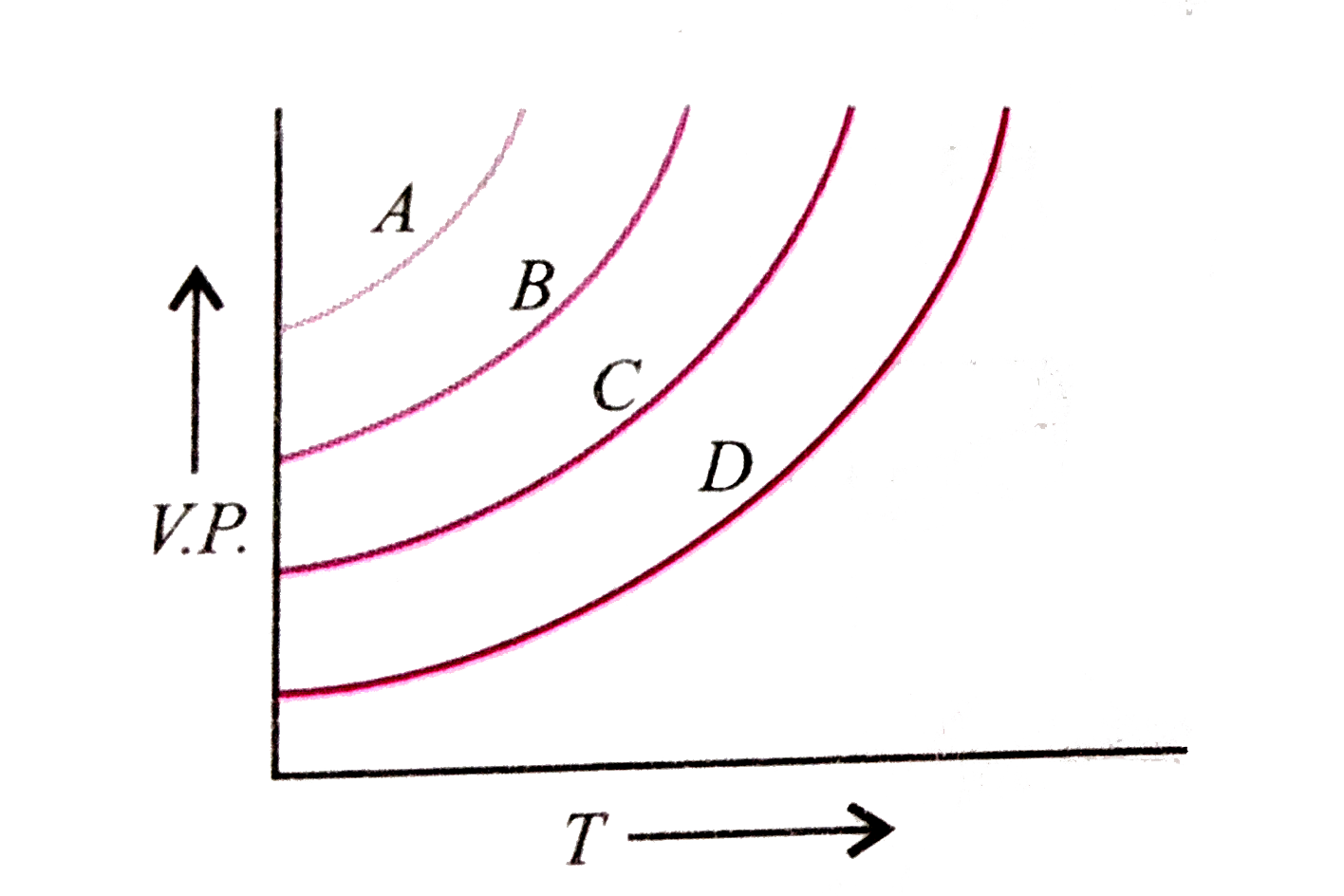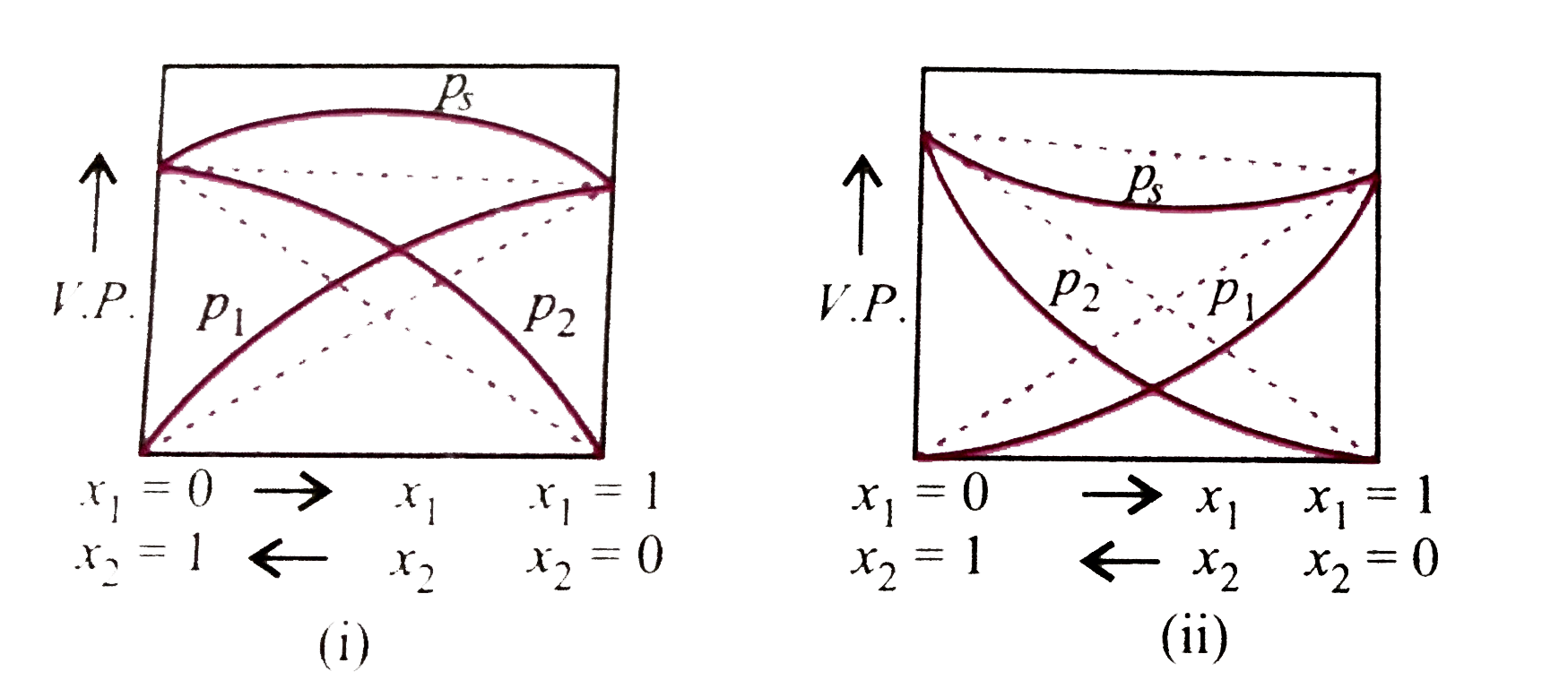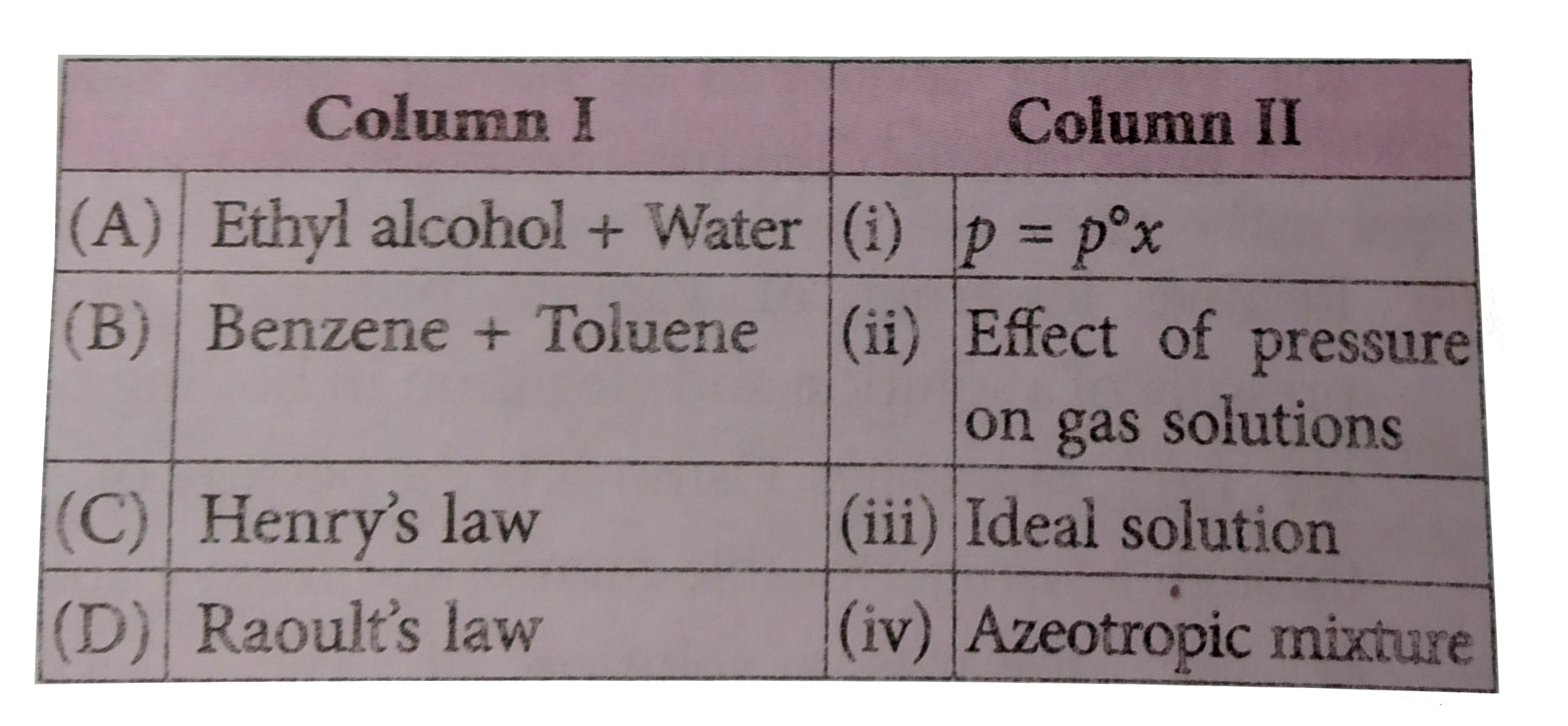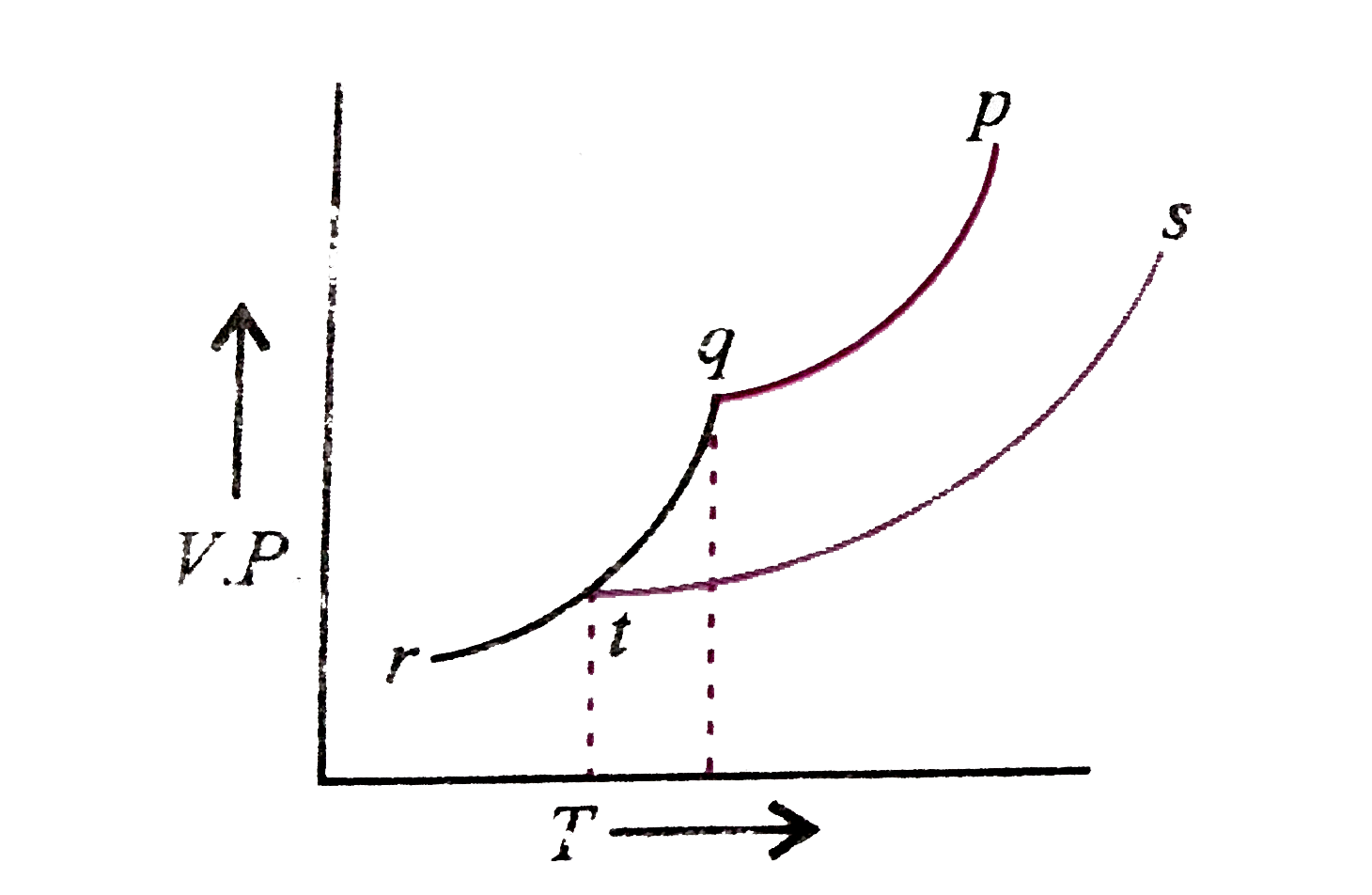Complete Solutions to MCQs of chapter SOLUTIONS of Class 12 book with complete answers and questions
| Class 12 | CHEMISTRY |
| Chapter | SOLUTIONS |
| NCERT FINGERTIPS | MCQs |
| Number Of Questions | 90 |
| Academic Year | 2023-24 |
Homogeneous mixture of two or more than two components is called
View SolutionWhich of the following is an example of gaseous solution ?
View SolutionIn amalgam of mercury with sodium, solvent is
View SolutionWhat is the mass percentage of carbon tetrachloride if 22 g of benzene is dissolved in 122 g of carbon tetrachloride ?
View SolutionWhat is the mole fraction of glucose in 10% w/W glucose solution ?
View SolutionCalculate the percentage composition of a solution obtained by mixing 200 g of a `30%` and 300 g of a `20%` solution by weight.
View SolutionWhen 1.04 g of `BaCl_2` is present in `10^5` g of solution the concentration of solution is
View SolutionWhat will be the mole fraction of ethanol in a sample of spirit containing 85% ethanol by mass ?
View SolutionWhat is the molarity of a solution containing 10 g of NaOH in 500 mL of solution ?
View SolutionWhat will be the molarity of 30 mL of 0.5 M `H_2SO_4` solution diluted to 500 mL ?
View SolutionHow many `Na^+` ions are present in 100 mL of 0.25 M of NaCl solution ?
View SolutionHow many moles of sodium chloride present in 250 mL of a 0.50 M NaCl solution ?
View Solution250 ml of a sodium carbonate solution contains 2.65 grams of `Na_(2)CO_(3)`. If 10 ml of this solution is diluted to one litre, what is the concentration of the resultant solution (mol. Wt. of Na_(a)`CO_(3)=106`)
View SolutionThe density of a solution prepared by dissolving 120 g of urea (mol. Mass=60 u) in 1000 g of water is 1.15 g/mL. The molarity if this solution is
View SolutionWhat will be the value of molality for an aqueous solution of 10% w/W NaOH?
View SolutionThe molarity of 648 g of pure water is
View SolutionCalculate the mass of urea `(NH_(2)CONH_(2))` required in making `2.5 kg `of `0.25 `molal aqueous solution.
View SolutionConcentration terms such as mass percentage, ppm, mole fraciton and molality are independent of temperature, however molarity is a function of temperature. Explain.
View SolutionExpress the terms representing the following formulae .
(i)`"No. of moles of solute"/"Volume of solution in litres"=(W)`
(ii)`"No. of moles of solute"/"Mass of solvent in kg"=(X)`
(iii)`"No. of moles of component"/"Moles in the solution"=(Y)`
(iv)`"Mass of component"/"Mass of solution"=(Z)`
View SolutionSolubility of a substance is its maximum amount that can be dissolved in a specified amount of solvent. It depends upon
(i)nature of solute , (ii)nature of solvent , (iii)temperature , (iv)pressure
View SolutionDuring dissolution when solute is added to the solvent, some solute particles separate out from the solution as a result of crystallisation . At the stage of equilibrium, the concentration of solute in the solution at given temperature and pressure
View SolutionThe law which indicates the relationship between solubility of a gas in liquid and pressure is ____
View SolutionAccording to Henry's law the partial pressure of the gas in vapour phase (p) is proportional to the mole fraction of the gas (x) in the solution . For different gases the correct statement about Henry's constant is
View SolutionThe value of Henry's law constant for some gases at 293 K is given below. Arrange the gases in the increasing order of their solubility .
He:144.97 kbar, `H_2`:69.16 kbar, `N_2`:76.48 kbar, `O_2`: 34.86 kbar
View Solution`H_(2)S`, a toxic gas with rotten egg like smell, is used for the qualitative analysis.If the solubility of `H_(2)S` in water at `STP` is `0.195 m`, calculate Henry's law constant.
View SolutionHenry's law constant for the molality of methane in benzene at `298K `is `4.27xx10^(5)mm Hg`. Calculate the solubility of methane in benzene at `298 K` under `760 mm Hg`.
View SolutionWhen a gas is bubbled through water at 298 K, a very dilute solution of gas is obtained . Henry's law constant for the gas is 100 kbar. If gas exerts a pressure of 1 bar, the number of moles of gas dissolved in 1 litre of water is
View SolutionHenry's law constant of oxygen is `1.4 xx 10^(-3)` mol `"lit"^(-1) "atm"^(-1)` at 298 K. How much of oxygen is dissolved in 100 mL at 298 K when the partial pressure of oxygen is 0.5 atm?
View SolutionAt high altitudes the partial pressure of oxygen is less than that at the ground level. This leads to
View SolutionPartial pressure of a solution component is directly proportional to its mole fraction. This statement is known as
View Solution3 moles of P and 2 moles of Q are mixed , what will be their total vapour pressure in the solution if their partial vapour pressures are 80 and 60 torr respectively ?
View SolutionAmong the following substances, the lowest vapour pressure is exerted by
View SolutionThe given graph shows the vapour pressure - temperature curves for some liquids

Liquids A,B, C and D respectively are
View SolutionFor an ideal solution with `P_A gt P_B` , which of the following is true ?
View SolutionWhat are the conditions for an ideal solution which obeys Raoult's law over the entire range of concentration ?
View SolutionIntermolecular forces between n-hexane and n-heptane are nearly same as between hexane and heptane individually. When these two are mixed, which of the following is not true about the solution formed ?
View SolutionWhich of the following solutions shows positive deviation from Raoult's law ?
View SolutionWhich of the following solutions is an example of negative deviation from Raoult's law ?
View SolutionStudy the figures given below and mark the correct statement.

View SolutionWhen acetone and chloroform are mixed together , hydrogen bonds are formed between them. Which of the following statements is correct about the solution made by mixing acetone and chloroform ?
View SolutionGiven below are few mixtures formed by mixing two components . Which of the following binary mixtures will have same composition in liquid and vapour phase ?
(i)Ethanol + Chloroform
(ii)Nitric acid + Water
(iii) Benzene + Toluene
(iv)Ethyl chloride + Ethyl bromide
View SolutionFill in the blanks with appropriate words.
Azeotropic mixtures boil without change in their ___.Azeotropic mixtures exist in solutions showing ___ or ____ deviations. ____ solutions do not form azeotropes. Van't Hoff factor for an electrolyte is ___ than 1.
View SolutionThe system that forms maximum boiling azeotrope is
View SolutionTwo liquids `HNO_3` (A) and water (B) form a maximum boiling azeotrope when mixed in the ratio of 68% and 32% respectively . It means
View SolutionWhich of the following azeotropes is not correctly matched ?
View SolutionMatch the column I with column II and mark the appropriate choice.

View SolutionThe relative lowering in vapour pressure is proportional to the ratio of number of
View SolutionVapour pressure of a pure liquid X is 2 atm at 300 K. It is lowered to 1 atm on dissolving 1 g of Y in 20 g of liquid X. If molar mass of X is 200, what is the molar mass of Y ?
View SolutionAn aqueous solution of `2` per cent `(wt.//wt)` non-volatile solute exerts a pressure of `1.004` bar at the boiling point of the solvent. What is the molecular mass of the solute?
View SolutionA solution containing 12.5 g of non-electrolyte substance in 185 g of water shows boiling point elevation of 0.80 K. Calculate the molar mass of the substance. (`K_b=0.52 K kg mol^(-1)`)
View SolutionIf 1 g of solute (molar mass = `50 g mol^(-1)`) is dissolved in 50 g of solvent and the elevation in boiling point is 1 K. The molar boiling constant of the solvent is
View SolutionIn the given graph, pq,pr and st represent

View Solution2 g of sugar is added to one litre of water to give sugar solution. What is the effect of addition of sugar on the boiling point and freezing point of water ?
View SolutionHow does sprinking of salt help in clearing the snow covered roads in hilly areas? Explain the phenomenon involved in the process.
View SolutionEquimolar solutions in the same solvent have-
View SolutionA 5% solution (w/W) of cane sugar (molar mass = 342 g `mol^(-1)` ) has freezing point 271 K. What will be the freezing point of 5% glucose (molar mass = 18 g `mol^(-1)`) in water if freezing point of pure water is 273.15 K ?
View SolutionWhat weight of glycerol should be added to 600 g of water in order to lower its freezing point by `10^@ C` ?
`(K_f=1.86^@ C m^(-1))`
View SolutionRelative lowering of vapour pressure , osmotic pressure of a solution and elevation in boiling points are __(p)___ properties. Osmosis is the passage of __(q)__ through a semipermeable membrane from a solution of __(r)__ towards a solution of __(s)__ . Osmotic pressure is equivalent to mechanical pressure which must be applied on __(t)__ to prevent osmosis.
In the above paragraph p,q,r,s and t respectively are
View SolutionThe osmotic pressure of a solution can be increased by
View SolutionPeople taking lot of salt experience puffiness or swelling of the body due to
View SolutionThe preservation of meat by salting and of fruits by adding sugar protects them from bacterial action because
View SolutionSea water is desalinated to get fresh water by which of the following methods ?
View SolutionA `5%` solution of cane sugar (molecular weight=342) is isotonic with `1%` solution of substance `X`.The molecular weight of `X` is
View SolutionWhich of the following statements is correct about diffusion and osmosis ?
(i)In Osomosis, a semipermeable membrane is used while diffusion is without membrane .
(ii) In osmosis, movement of molecules occurs in one direction while in diffusion, movement occurs in all directions
(iii)In osmosis only the solvent moves while in diffusion both solute and solvent move
View Solution10% solution of urea is isotonic with 6% solution of a non-volatile solute X.What is the molecular mass of solute X ?
View SolutionA solution containing 10.2 g of glycrine per litre is found to be isotonic with 2% solution of glucose `("molar mass"=180 g mol^(-1))`. Calculate the molar mass of glycrine.
View SolutionWhat will be the osmotic pressure in pascals exerted by a solution prepared by dissolving 1.0 g of polymer of molar mass 150,000 in 500 mL of water at `37^@C` ?
View SolutionOsomotic pressure of a solution containing 2 g dissolved protein per 300 `cm^3` of solution is 20 mm of Hg at `27^@C`. The molecular mass of protein is
View SolutionTwenty grams of a substance were dissolved in 500ml. Of water and the osmotic pressure of the solution was found to be 600mm of mercury at `15^(@)"C".` Determine the molecular weight of the substance.
View SolutionWhich of the following statements is not correct ?
View SolutionA plant cell shrinks when it is kept in
View SolutionWhich of the following statements is correct ?
View SolutionFor carrying reverse osmosis for desalination of water the material used for making semipermeable membrane is
View SolutionWhich of the following is not an industrial or biological importance of osmosis ?
View SolutionWhy is the molecular mass determined by measuring colligative property in case of some solutes is abnormal ?
View SolutionWhich of the following representations of I (van't Hoff factor) is not correct ?
View SolutionWhich of the following relations is not correctly matched with the formula ?
View SolutionWhich of the following will have same value of van't Hoff factor as that of `K_4[Fe(CN)_6]` ?
View SolutionArrange the following aqueous solutions in the order of their increasing boiling points
(i)`10^(-4)` M NaCl , (ii)`10^(-4)` M Urea , (iii)`10^(-3)` M `MgCl_2` , (iv)`10^(-2)` M NaCl
View SolutionWhich of the following has the highest freezing point ?
View SolutionIf `alpha` is the degree of dissociation of `Na_(2)SO_(4)` the van't Hoff's factor (i) used for calculating the molecular mass is
View SolutionFor which of the following solutes the van't Hoff factor is not greater than one ?
View SolutionWhat will be the degree of dissociation of 0.1 M `Mg(NO_3)_2` solution if van't Hoff factor is 2.74 ?
View SolutionWhich of the following will have the highest freezing point at one atmosphere ?
View SolutionA solute forms a pentamer when dissolved in a solvent. The van't Hoff factors 'I' for the solute will be :
View SolutionWhat will be the freezing point of a 0.5 m KCl solution ? The molal freezing point constant of water is `1.86^@C m^(-1)` .
View SolutionWhat amount of `CaCl_2` (i=2.47) is dissolved in 2 litres of water so that its osmotic pressure is 0.5 atm at `27^@` C ?
View SolutionThe van't Hoff factor of a 0.005 M aqueous solution of KCl is 1.95. The degree of ionisation of KCl is :
View SolutionThe elevation in boiling point of a solution of 9.43 g of `MgCl_2` in 1 kg of water is ( `K_b` = 0.52 K kg `mol^(-1)` , Molar mass of `MgCl_2 = 94.3 g mol^(-1)`)
View SolutionA 0.001 molal solution of `[Pt(NH_(3))_(4)CI_(4)]` in water had a freezing point depression of `0.0054^(@)C`. If `K_(f)` for water is `1.80`, the correct formulation for the above molecule is
View Solution
MCQs questions and complete solutions for chapter SOLUTIONS of MTG CHEMISTRY (ENGLISH) of Class 12
All Exercises from NCERT FINGERTIPS Class 12 CHEMISTRY SOLUTIONS
- Abnormal Molar Masses
- ASSERTION & REASON
- Assertion And Reason
- Colligative Properties And Determination Of Molar Mass
- EXEMPLAR PROBLEMS
- Expressing Concentration Of Solutions
- Higher Order Thinking Skills
- HOTS
- Ideal And Non-Ideal Solutions
- MCQs
- NCERT Exemplar
- Solubility
- Types Of Solution
- Vapour Pressure Of Liquid Solutions